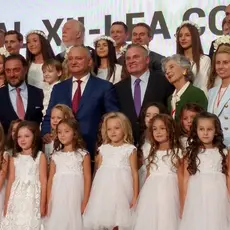Among the speakers at the World Congress of Families on Thursday was Mark Tooley of the Institute on Religion and Democracy (IRD), who declared that too many Christians are being influenced by secular ideology and are clueless that God himself has ordered government to fight same-sex marriage and access to abortion.
Tooley’s group supports conservatives within mainline Protestant churches (he is a United Methodist) by attacking liberal elements within those denominations that promote progressive theology and public policy. For example, IRD has criticized the U.S. State Department for promoting the human rights of LGBT people and spoken out against evangelicals backing immigration reform.
At the World Congress of Families, Tooley decried the embrace of LGBT equality and reproductive choice among “once great” mainline denominations, and warned that the “errors” of mainline Protestantism have spread to evangelical and Catholic communities.
The problems that had originated in America’s mainline Protestant world unfortunately have spread and metastasized throughout American religion, and even once great and strongly orthodox religious institutions in America are now affected by these issues and are compromised on core topics related to marriage and family and the sanctity of all human life.
He blamed the shift on the institutions’ “elites and bureaucracies,” which he said no longer believe in ancient Christian teachings but have “actively joined secularism to advocate deconstruction of marriage and family.” Those ideas have spread to other Christian institutions, he complained, including the “evangelical left” and Christian colleges, whose leaders don’t want to engage on these issues because they believe it would interfere with evangelization.
Tooley complained that there weren’t enough Christian leaders defending Kim Davis, the Kentucky county clerk who was jailed for six days after she refused to abide by a federal court order to provide marriage licenses to same-sex couples after the Supreme Court’s marriage equality ruling. Tooley predicted that more people will be intimidated into “virtual silence” as the government punishes other marriage resisters, but he hoped the opposite might also be true, and that the accumulating impact of those cases might inspire others to take a more public stand.
Tooley said that organized Christian political social justice advocacy aimed at young people has focused more on admirable but less controversial issues like fighting sex trafficking or carrying out humanitarian work. He complained that too many young Christians see marriage as passé as a public policy issue and religious liberty work as self-serving— and even think that work on abortion is too focused on therapeutic ministry rather than political advocacy to put abortion bans into law.
Tooley connected this to Christians’ lack of understanding that God himself has given the government a divine mandate to oppose marriage equality and abortion.
Indeed, all of the punitive aspects of the civil state, which are central to God’s vocation for government, have become unfashionable or at least uninteresting to much of Christian political witness in America today — except for possibly punishing perpetrators of discrimination against same-sex couples.
Yet historic Christian teaching says the state has a divinely ordained, ongoing permanent duty to uphold marriage, family, and to protect all human life, irrespective of fashion and fad.
There is a pervasive lack of awareness in current Christian discourse, not limited to the very young, about historic Christian understandings about the core responsibilities of government. Instead of providing for public order — jailing criminals and deterring or defeating external aggressors — government is now portrayed in Christian political witness as the all-powerful and maternal provider, who feeds, clothes, heals, educates and reaffirms, callings that Christianity typically had assigned to parents, families, churches, private philanthropy, civil society and therapists.
Even traditional Christians, he complained, often appear clueless about religious responses to these trends, resorting to libertarian arguments against big government “without describing the state’s core mandate assigned by no less than God himself. Addressing this collapse in Christian understanding about God’s purpose for the state is a wonderful, and important, but almost overwhelming challenge for groups like mine, but also all of us in this room and beyond.”
Tooley closed with a prayer for victory in the culture war:
We can hope and pray, in the fullness of Providence, that the Almighty will look back on these days that we’re living through and say to us who have tried to follow him, this was one of our finest hours, in a great social and cultural storm when his truths were most under assault. May he guide us to perseverance and victories ahead for the common good of all people.





